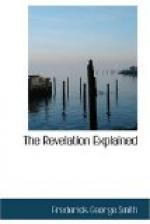This salutation of John’s is one of great beauty and splendor, setting forth, as it does, the divine attributes of the great Jehovah in a striking manner as he “which is, and which was, and which is to come,” an expression embracing eternity and designating the eternal, unchangeable God. The seven spirits before his throne describe the third person in the Trinity, as will appear clearer hereafter, seven being used as a sacred or perfect number designating his dignity and excellence. Some have supposed that seven angelic spirits were here described; but it is not consistent with the honor due the God-head to suppose that created intelligences should be exalted to a plane of equality with the supreme Deity. Moreover, they would probably have been described as seven angels, and not as seven spirits.
Jesus Christ is mentioned next and more fully described, he being the direct author of the Revelation. He is “the first begotten of the dead, the prince of the kings of the earth,” and the one “that loved us, and washed us from our sins in his own blood.” The statement that Christ is the “first-begotten of the dead,” is parallel to similar expressions in the Bible, where he is declared to be “the first-fruits of them that slept,” “and the first-born from the dead.” Though others had been restored to life before the resurrection of Christ, yet he was the first to rise with an immortal, glorified body. These expressions may also denote that Christ was the chief or central figure among all those who arose. But it was by virtue of his coming and of his victory over death that any were enabled to rise before his resurrection, as in the mind and purpose of God, who “calleth those things which be not as though they were” (Rom. 4:17), Christ was ordained to die and rise again, from the foundation of the world. He is the “prince of the kings of the earth” by virtue of his being exalted to the right hand of God, with “angels and authorities and powers being made subject unto him.” 1 Pet. 3:22. “Far above all principality, and power, and might, and dominion, and every name that is named, not only in this world, but also in that which is to come.” Eph. 1:21.
“Unto him that loved us, and washed us from our sins in his own blood,” describes the great atonement work of Jesus Christ, by which we are cleansed from all sin and made a royal, kingly priesthood unto God even in this world. Every soul that has received the blessed experience John here describes will be able to appreciate the unbounded rapture the beloved apostle felt in the contemplation of this wonderful theme of redemption that caused him to ascribe to God, its author, “glory and dominion forever and ever.”




